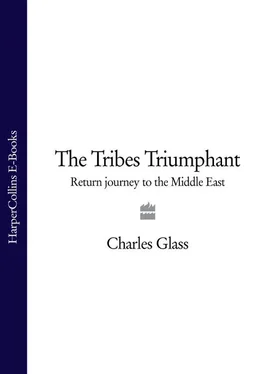‘The most dangerous time was the period after the ’67 war,’ Rifai said. ‘For Jordan, it wasn’t a six-day war. It was a four-year war. There was the battle of Karameh in 1968. There were daily bombardments and air raids by the Israelis. There was anarchy with the presence of Palestinian commandos. We had fifty-two commando organizations, including the Red Brigades, Baader – Meinhof and Carlos the Jackal. We had no idea they were all here until September 1970.’ He described a time of chaos, when Palestinian commandos briefly held the Western press corps hostage in the InterContinental Hotel.
‘The borders were open. We had Iraqi troops in the country. We had no idea the Palestinians were so well dug in. They planted land mines and had rocket-propelled grenades. They took control of this city. Our army was on the front lines with Israel. The Palestinian commandos put up checkpoints. They stole cars. They took donations to the cause by force. They kidnapped. They had their own newspapers. Remember their slogan, that they would liberate Jerusalem by liberating Amman. The army almost revolted. When soldiers came to spend weekends with their families in Amman, the commandos would kidnap, kill and mutilate them. Battalions in the Jordan Valley would hear what happened to fellow soldiers. The units would come up here on their own. I would go with His Majesty and Zayd Bin Shaker’ – Bin Shaker, King Hussein’s uncle, was the army commander – ‘to stop them. There was a decision by His Majesty. We waited and waited.’
On 15 September 1970, King Hussein appointed a military government to force the commandos out of Amman. The Jordanian parliament sent a delegation to ask Yasser Arafat to evacuate without a fight. Rifai’s version of Arafat’s reaction was, ‘He told them, “The situation has run out of my hands. The best I can do for you is to give King Hussein twenty-four hours to leave the country.” ’
Hussein stayed. After two weeks of intensive fighting, during which Jordan’s Bedouin troops massacred Palestinians and bombarded their camps, it was Arafat who left. Negotiations between King Hussein and Yasser Arafat in Cairo may have caused the heart attack that killed Gamal Abdel Nasser the night after the two Arab chiefs left. With Nasser’s death, Arab nationalism retreated and left the field to the steady advance of political Islam.
Did Arafat, who made several attempts on Hussein’s life, reconcile with the king? ‘Oh, yes,’ Rifai said. ‘They made up. Arafat often came here. He was received as a head of state. With politics in the Middle East, you can’t afford to have a long memory. You won’t be able to talk to anyone.’
After the war, Arafat’s commandos assassinated Jordanian prime minister Wasfi Tel outside the Hilton Hotel in Cairo. Someone also tried to kill Rifai, when he was ambassador in London. ‘We were in a narrow road coming from Regent’s Park,’ he said. ‘The driver was making a right turn. They were standing on a little traffic island and started shooting point-blank. I was reading the paper. The car was a big Daimler. It was The Times , I remember. I was crouching like this.’ Rifai bent forward. ‘The first bullets hit my hand and ear. I reacted quickly. I threw myself to the floor. They found forty bullets, and the fire was concentrated on the back seat. A Scotland Yard inspector said he didn’t believe a canary would survive.’ Rifai blamed the clandestine arm of Yasser Arafat’s Al Fateh, Black September, for the attack.
The Jordanians responded in kind, assassinating PLO officials in their post-Amman headquarters, Beirut.
That evening, an old friend of Rifai’s met me for a drink. I told him the story about the attempt on his life. ‘Black September?’ the friend asked. ‘Maybe. We always thought they were London gangsters trying to collect gambling debts.’
I saw old friends in Amman, among them Riad and Zein Khoury, Prince Talal and his beautiful Lebanese wife, Princess Ghida, and the children of both couples. All of them worried, not about Jordan, but about the neighbours. They hated the Israeli occupation of the West Bank and Gaza and what it was doing to the Palestinians. They hated the economic embargo of Iraq on their eastern border and the cost in lives of Iraqi children. It was a rare Jordanian who had no relations or friends west of the River Jordan or east of the great desert in Iraq. They did not love Yasser Arafat, who they said was a useless leader, or Saddam Hussein, a vicious tyrant. The United States sustained the wretchedness of Palestinians and Iraqis. America paid for Israel’s illegal settlements on illegally occupied land, and America enforced the boycott that deprived Iraq’s children of medicines and treated water. It would soon invade Iraq, making life there even worse. Yet none of my Jordanian friends dared to suggest a public gesture – boycotting American goods, severing diplomatic relations or closing an American hotel – to affect Washington’s policies.
The bullet holes I saw on my first visit here in 1973 had been erased. Monster buildings had transformed the terrain of battle between the brave fedayeen and the hardy Bedouin into a zone of combat for market share, for the greater triumph of AT&T and Sheraton and for the acquisition of newer cars and cellphones. Amman sustained the dullness from which its Hashemite monarchs, the British and several wars had not redeemed it. Its sleepy hills, in which a few thousand Circassians had lived in their huts of rock, did not welcome disturbance. It was not a land of flooding rivers or icy precipices or earthquakes. Amman perched on gentle hills, and its inhabitants closed their doors on excitement. It had been the wrong stage for the Palestinians to enact their revolutionary drama. I did not linger in Amman.
The car journey from Amman to Jerusalem should take an hour and a half. But it does not take an hour and a half. It takes many hours. If you are a Palestinian, it can take for ever. For me, it was five hours in several taxis and one bus, most of that time absorbed, not on the highway observing the wildlife, but waiting at the border.
If I curse Britain and France, despite having lived in and loved them both, it is for these borders. Travelling from Beirut to Damascus, or Damascus to Amman, or Amman to Jerusalem – all simple trips along good roads with no insuperable natural obstacles – constituted an ordeal for all travellers. So mutually suspicious were the mini-states of Greater Syria that they mistreated all who entered or left. All showed Europeans and Americans less discourtesy, and the Jordanians were more polite to Israelis. The Syrians and Lebanese would not admit Israelis or anyone with an Israeli visa in his passport. Every border policeman – Israeli, Jordanian, Syrian or Lebanese – made a point of humiliating any Arab who came his way.
On the way to the River Jordan, the road sticks to the earth’s contours, flowing like water through the easiest downward passages. The Jordan Valley was the hot land, where the wool cloaks of mountain shepherds yielded to the peasant’s light cotton robe. Here were sandy wastes, lush meadows, small farms and greenhouses dressed in plastic sheets. In December 1917, when the British captured Jerusalem, Allenby’s forces fought to link their army near here with the Hashemites who were advancing north on a parallel march. But the linking was not to be. The British were repulsed by Turkish forces north of the town of Salt, and Lawrence was unable to take Ma’an in the east. In the event, each army made its separate way up to Damascus. By then, each understood that its interests and objectives diverged from the other’s. The Arabs, Lawrence knew, were fighting for independence in all of Greater Syria. The British planned to divide the land into European colonies with one corner, western Palestine, set aside as a reserve for Europe’s Jews. Palestine’s Arabs would be sacrificed to pay for European anti-Semitism. The Arabs reached Damascus, but Britain prevailed.
Читать дальше












